Key takeaways:
- Child safeguarding requires a holistic approach that addresses physical, emotional, and psychological support for children.
- Integrity in policies fosters trust, accountability, and a culture of continuous improvement in safeguarding efforts.
- Key principles of policy evaluation include clarity in objectives, stakeholder involvement, and adaptability to changing circumstances.
- Promoting integrity involves clear communication, ethical training for evaluators, and establishing accountability systems.
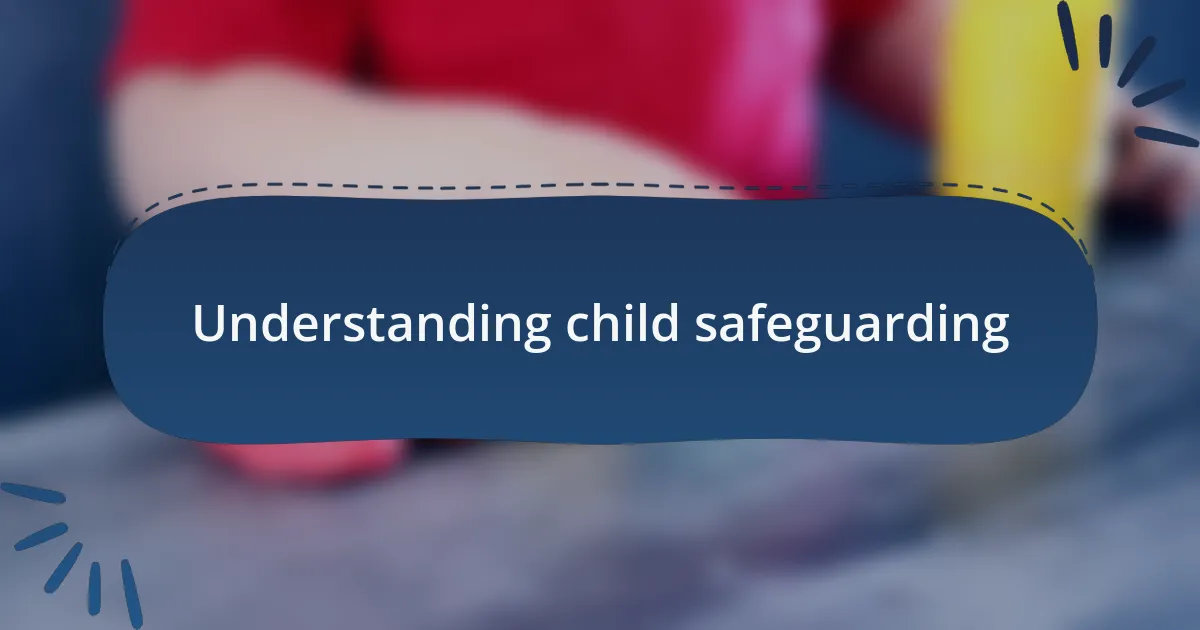
Understanding child safeguarding
Child safeguarding is fundamentally about protecting children from harm and ensuring their well-being in all environments. I remember my first experience in a safeguarding workshop, where I felt a wave of responsibility wash over me. It made me question: how can we ensure that every child feels safe and valued? This journey starts with understanding the risks children face and the importance of creating policies that prioritize their safety.
Delving deeper into child safeguarding, we must recognize that it encompasses not only physical protection but also emotional and psychological support. I once spoke to a social worker who shared a heartbreaking story of a child who felt invisible in their home. This experience reinforced for me that safeguarding is a holistic approach; we must appreciate the complexities of a child’s life and create environments where they can thrive.
Moreover, it’s essential to engage the whole community in this effort. Reflecting on community programs that I’ve participated in, I see the power of collaboration. When schools, families, and local agencies unite, we can foster an atmosphere of vigilance and care. How can we inspire everyone to take part? It begins with open conversations about safeguarding and shared commitments to placing children’s rights at the forefront.
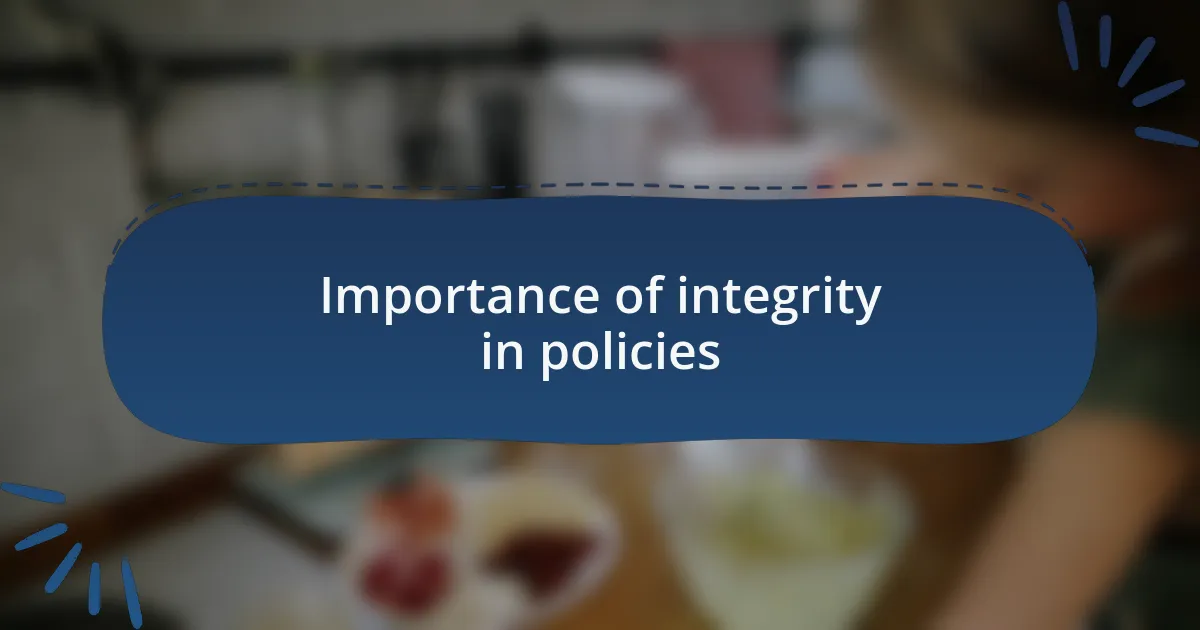
Importance of integrity in policies
Policies rooted in integrity serve as a foundation for trust within child safeguarding. I remember a situation where a poorly drafted policy led to confusion among staff, undermining their ability to protect children effectively. This experience taught me that integrity in policies is not just about rules; it’s about creating a transparent environment where everyone knows their role in safeguarding.
When policies reflect integrity, they foster accountability. I once facilitated a training session where staff openly discussed challenges they faced in implementation. Listening to their concerns, I realized that when people see integrity reflected in the policies they follow, they are more likely to take ownership of their responsibilities, ultimately benefiting the children they serve.
Moreover, integrity in policy evaluation promotes a culture of continuous improvement. I have witnessed how regular assessments of safeguarding policies can lead to meaningful changes, informed by real experiences and challenges encountered in the field. It begs the question: how can we truly understand the effectiveness of our policies without this commitment to integrity and honesty in evaluation? Emphasizing integrity ensures that these evaluations lead to genuine enhancements in our safeguarding efforts.
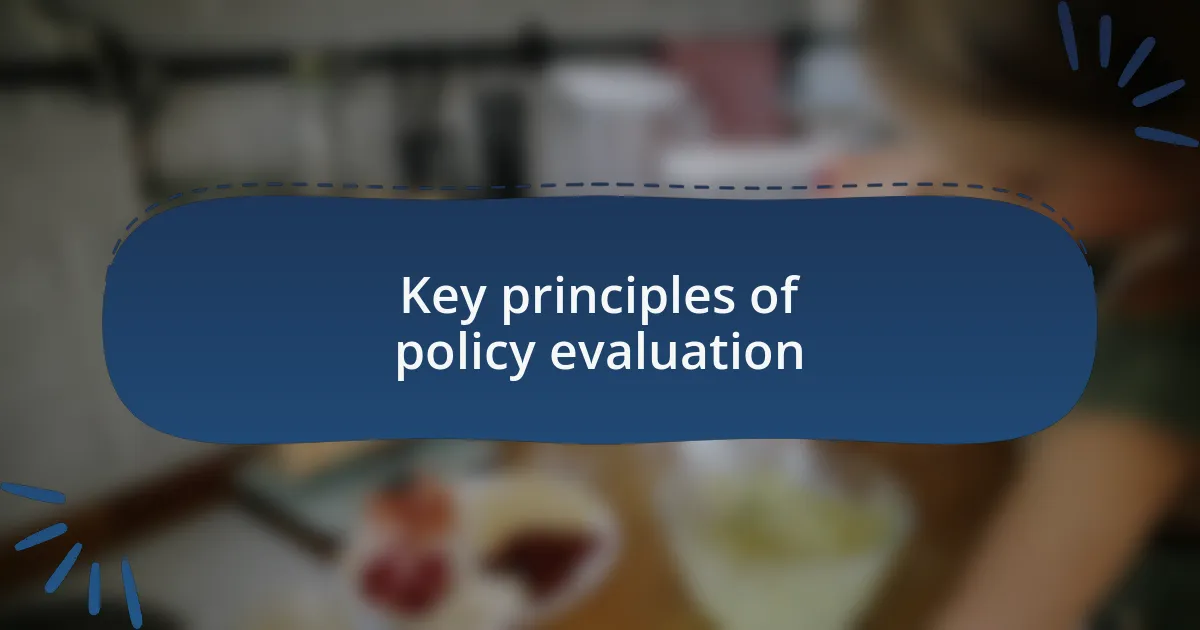
Key principles of policy evaluation
One key principle of policy evaluation is clarity in objectives. I once found myself in a workshop where stakeholders struggled to articulate the goals of a child safeguarding policy. This experience underscored how essential it is for everyone involved to have a shared understanding of what the policy aims to achieve. When goals are transparent, it sets a clear benchmark for evaluating effectiveness. So, I often ask myself, how can we assess success if we haven’t clearly defined what success looks like in the first place?
Another crucial principle is stakeholder involvement. During a review committee meeting on a safeguarding policy, I noticed diverse voices brought unique perspectives that enriched the evaluation process. I realized that integrating feedback from different stakeholders—like social workers, educators, and even families—creates a more comprehensive view of a policy’s impact. It raises the question: can we afford to overlook the insights of those on the front lines of safeguarding?
Finally, the principle of adaptability plays a pivotal role in effective policy evaluation. I vividly recall a time when a sudden shift in local regulations forced us to reassess our policies quickly. Sticking rigidly to outdated frameworks only leads to dysfunction. By being open to adjustments based on ongoing evaluations, we not only stay relevant but also ensure that our policies continue to serve the children’s best interests. Isn’t it inspiring to think about how flexibility can enhance our effectiveness in safeguarding?
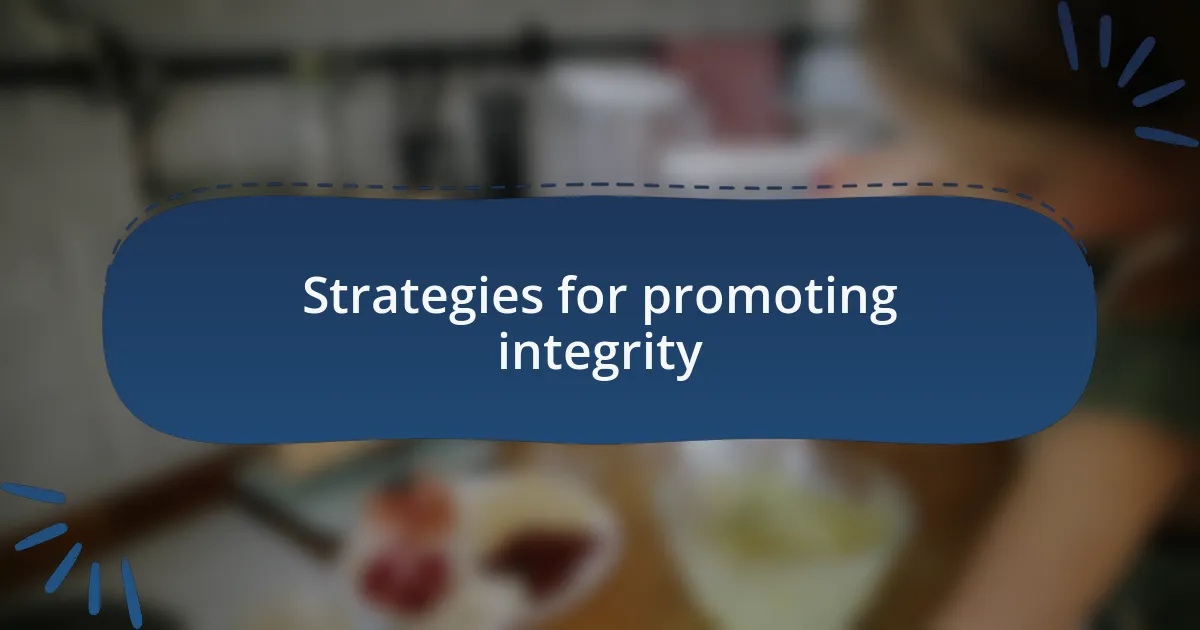
Strategies for promoting integrity
One effective strategy for promoting integrity in policy evaluation is establishing clear communication channels among all stakeholders. I remember a time when we implemented regular feedback sessions during the evaluation process of a child safeguarding initiative. This simple act not only fostered transparency but also created a safe space for everyone to voice their concerns and suggestions. Isn’t it fascinating how open dialogue can empower individuals and elevate the integrity of our evaluations?
Another key tactic involves training evaluators on ethical considerations and best practices. In a workshop I facilitated, we dove into real-world scenarios that underscored the importance of integrity in our work. Encouraging participants to share their dilemmas made it clear that ethical navigation is not always black and white. By equipping evaluators with the right tools to think critically about their decisions, we reinforce the foundation of integrity in the entire evaluation process.
Lastly, having a system for accountability is vital. During the rollout of a new safeguarding policy, I discovered the significance of regular check-ins to ensure adherence to ethical standards. This proactive approach not only helps to catch potential issues before they escalate but also instills a culture of responsibility. How can we truly ensure integrity if we aren’t willing to hold ourselves accountable for our actions and decisions? It’s a question worth pondering as we strive for the highest standards in child safeguarding.
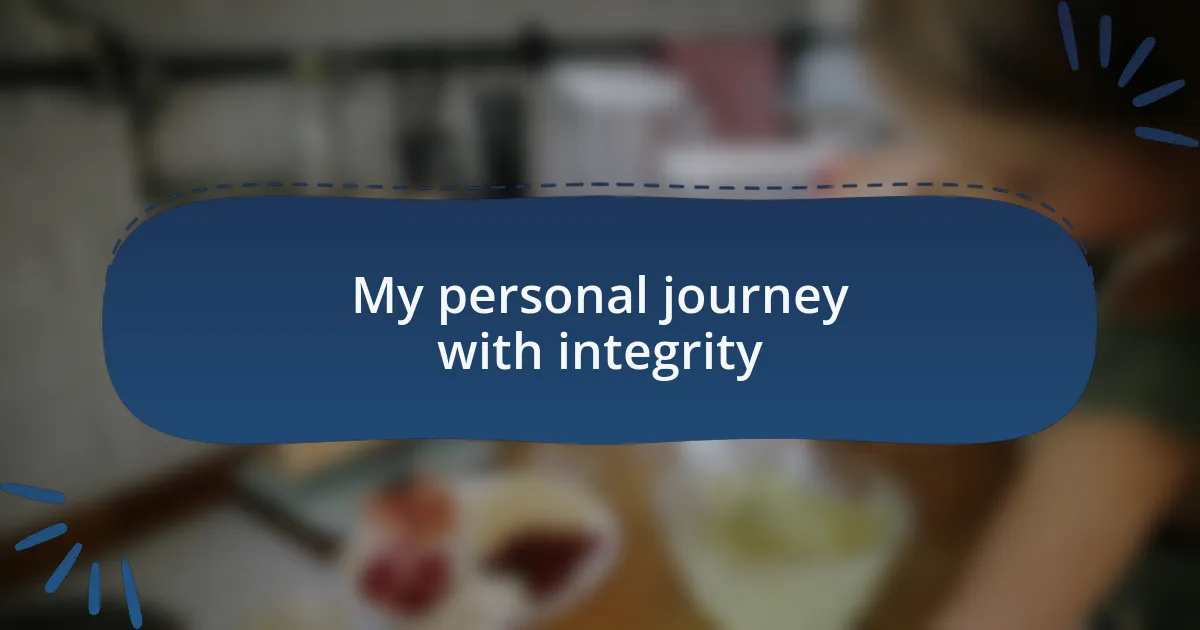
My personal journey with integrity
I’ve often found that my journey with integrity is intertwined with challenging moments that truly tested my values. One instance that stands out is when I was faced with a decision about a potential conflict of interest during a policy evaluation. I had to confront my own biases and ask myself: what would I advocate for if the roles were reversed? Ultimately, choosing to step back and seek an independent review not only reinforced my commitment to integrity but also helped strengthen the trust others placed in me.
Reflecting on my experiences, integrity also means being vulnerable enough to admit when I don’t have all the answers. There was a time when I presented findings that were met with skepticism. Instead of getting defensive, I embraced the opportunity to engage in deeper discussions and clarify my methodology. That experience taught me that admitting uncertainty doesn’t weaken my position; instead, it shows a genuine commitment to transparency and a willingness to learn. How often do we allow ourselves to be open to feedback in a way that strengthens our integrity?
Every step on this path has taught me that integrity is not just a concept; it’s a daily practice. I vividly remember the first time I had to hold a colleague accountable for not following ethical guidelines. It was uncomfortable, but I realized that my actions set a precedent for what we stood for as a team. Isn’t it amazing how a single moment of courage can ripple through an entire organization and foster an environment that prioritizes ethical behavior?
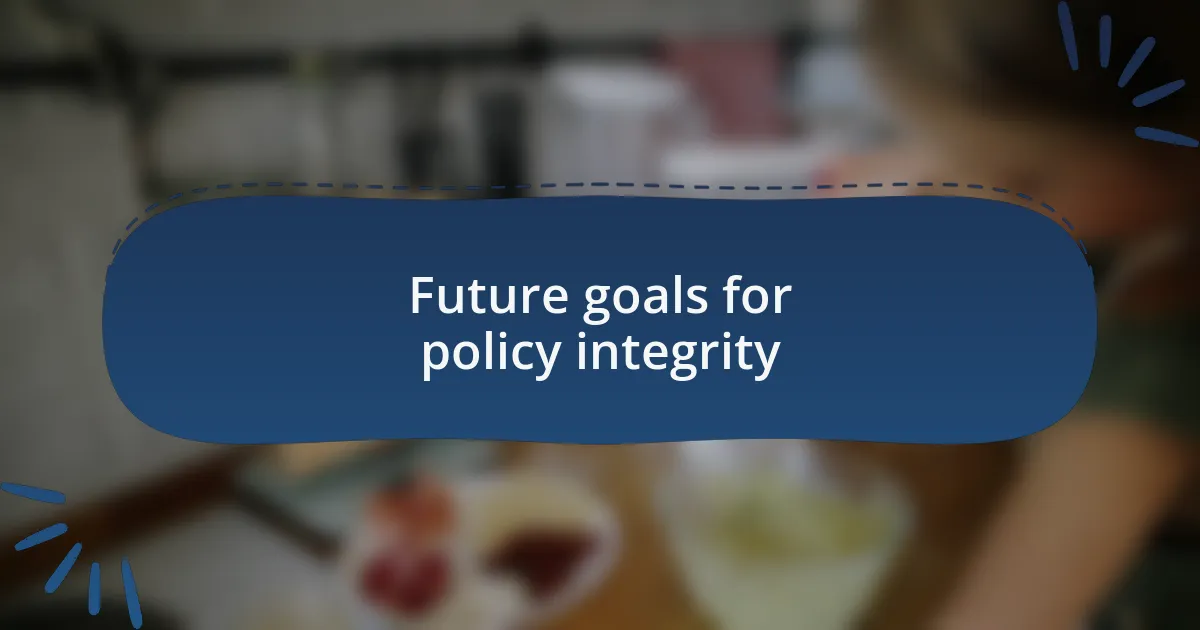
Future goals for policy integrity
As I think about future goals for policy integrity, I envision a landscape where transparency becomes the norm rather than the exception. I recall a time when I attended a workshop on accountability frameworks, and the discussions sparked an idea: what if we established regular public forums to discuss policy evaluations? Engaging stakeholders openly could demystify the process and embolden a collective commitment to integrity.
Additionally, I believe in embedding integrity into the foundation of every policy we create. For example, taking stock of feedback from those directly impacted—like children and families—can guide us toward practices that truly serve their best interests. Will this not not only enrich our policies but also validate the voices of those we aim to protect?
Lastly, it’s essential to foster a culture of continuous learning among policy evaluators. I often find that sharing case studies, both successes and failures, can illuminate pathways to integrity. How often do we miss the chance to learn from past experiences? It’s my hope that by prioritizing education and mentorship in this field, we can cultivate a new generation of advocates who not only understand policy integrity but embody it in their work every day.